Welcome to part 3 of our 4-part series on pet adoption!
Part 1: Should I Adopt a Puppy or an Adult Dog?
Part 2: 4 Important Decisions to Make Before Adopting a Dog
Coming Next:
Part 4: 6 Steps to Introduce a New Dog to Your Current Dog
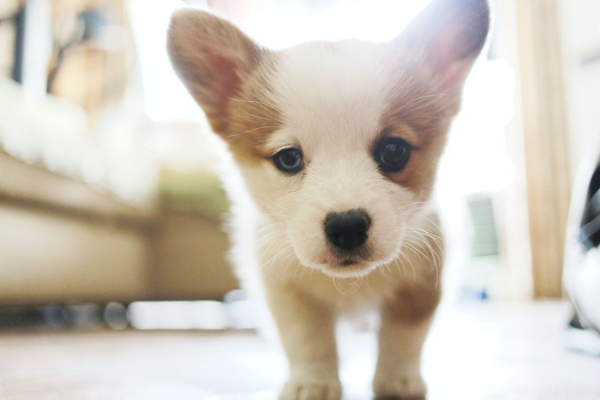
Think about all the ways a child learns to socialize with others from birth through the middle school years.
Now think about a puppy. One month of a puppy’s life is equivalent to approximately one year of a human child’s life. That’s why it’s critical to prepare your puppy to interact with people, other animals, and new situations when they are 8-to-14 weeks old.
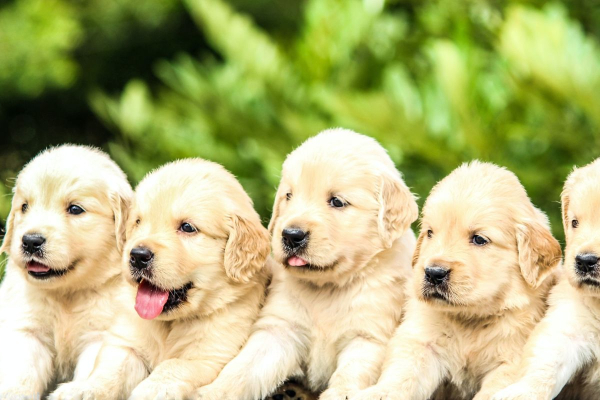
We can successfully help our pups learn socialization skills. We just have to be intentional about it. Similar to homeschooling our human children, we need to homeschool our puppies.
Think of it as “puppy pre-school.”
Here are 15 fun and easy ways you can socialize your puppy during that critical age of 8-to-14 weeks, to help them develop into a happy, confident, well-mannered dog.
Sight experiences
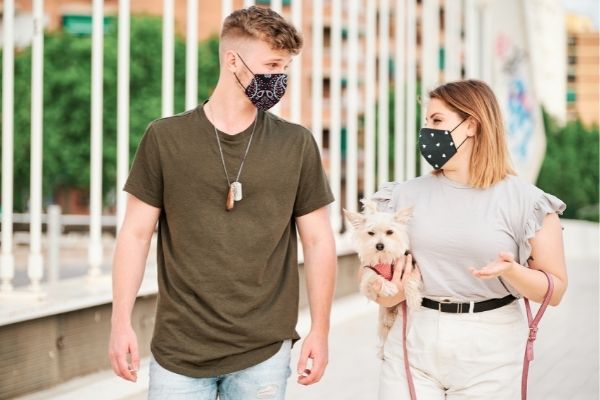
With face masks still being worn by many, it’s important to get your pup accustomed to seeing humans wearing masks. Inside your home, put on your mask, praise and treat your puppy, and then take off your mask. Repeat until your puppy is unfazed by face coverings.
In addition to practicing with face masks, train your puppy to interact with a “stranger” by wearing different hats, gloves, sunglasses, and clothing in the house and yard (do these things one at a time, not all in one day!).
Sound experiences
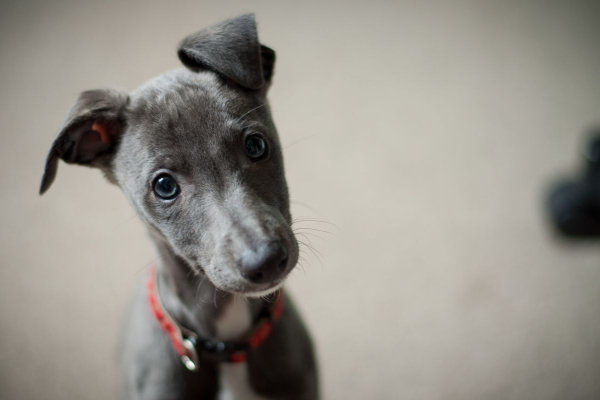
You want your puppy to remain calm when out in busy, loud public places where sudden sounds are likely to occur. Gradually expose your puppy to a variety of everyday sounds:
- phone ringtones
- electronic devices
- hair dryer
- vacuum cleaner
- pots and pans clanking
- shower or bathtub (running water)
- microwave
- radio and TV
- various forms of music
- doors opening and shutting
- doorbell
- garbage trucks
- traffic sounds
Watch for signs of stress, and make each new noise exposure experience as positive as possible by rewarding your pup with a treat and acting calm and happy around the sound.
Tactile experiences

Expose your puppy to a new tactile experience each day by introducing them to a variety of surfaces. Never force your puppy to step on these surfaces – allow them to take their time approaching and stepping on new surfaces, and reassure and reward them often.
- Concrete
- Linoleum
- Hardwood
- Dirt
- Sand
- Carpet
- Rubberized doormats
- Grass
- Leaves
- Mud
Of course, go for a walk in the rain so your pup gets accustomed to walking on wet surfaces.
Set up a simple “obstacle course” and encourage your puppy to walk over, under, and around objects with different textures, such as a pillow, cookie sheet, cardboard box, or skateboard.
Video
This video includes practical tips for creating fun socializing events.
Experiences with humans
To help your puppy get used to meeting new people, try these strategies:
- If you live with others, encourage every member of your household to spend one-on-one time cuddling, feeding, grooming, and playing with your puppy.
- Prepare your puppy for the different ways people will pet them. Pat them on the head. Scratch under their chin. Pet them against the grain of their fur, praising as you pet. If your puppy gets anxious, stop and try again later.
- Go for regular, short car rides to get your puppy used to traveling in a car.
- Drive to a local strip mall and sit in the parking lot. Give your puppy treats as you watch the action.
- Walk them around in the parking lot or on a sidewalk. When someone approaches, praise and give your puppy a treat until that person passes.
- Briefly stop and talk with others, while maintaining a safe distance from each other.
Experiences with animals
After two years of social distancing, we all know what that means for humans. Practicing social distancing when encountering other dogs is also ideal for your puppy, because you don’t want your pup to have a close encounter with an aggressive dog.
When you take your puppy for a walk and they spot another dog and want to stop and watch that dog walk by, let them. This helps your puppy understand that seeing other dogs is normal.
Practice walking past dogs in fenced yards who bark or run along with you. Watch your puppy’s reaction. Reassure your puppy and give them bits of food to reinforce appropriate behavior.
If there are dogs in your neighborhood that you trust to be well-mannered with your puppy, arrange short, positive doggy play dates while maintaining a safe distance from the other owner.
Alone Time
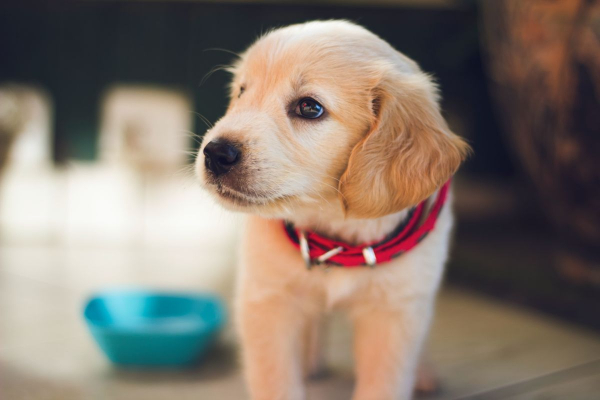
Learning to be without people around is as important as learning to be with them. While you may be working from home now, if you anticipate returning to a job outside the home, it’s important to create structured alone-time by crate training your puppy.
To help your puppy feel safe and less anxiety when you’re away, get an appropriately sized crate or set up a gated area (here’s a helpful article on how to crate train your dog in 9 easy steps).
Put your puppy in their crate or other safe area for a total of at least 2-4 hours a day. During that time, you and other household members should be in another part of the house.
Snuggle time
Most puppies love to be held, petted, and snuggled. Get your dog used to different types of handling by gently touching and examining their paws, nails, eyes, ears, mouth and tail several times each week (this will prepare them to visit the vet, too!).
Groom your puppy with a dog brush for 3-to-5 minutes per day.
Petting your puppy not only helps them feel more bonded to you, but it’s good therapy for you, too!
Routine
Puppies, like humans, thrive on routine. Make sure that your puppy eats, plays, and naps around the same time each day. These routines will prepare your puppy to face the world with confidence.


